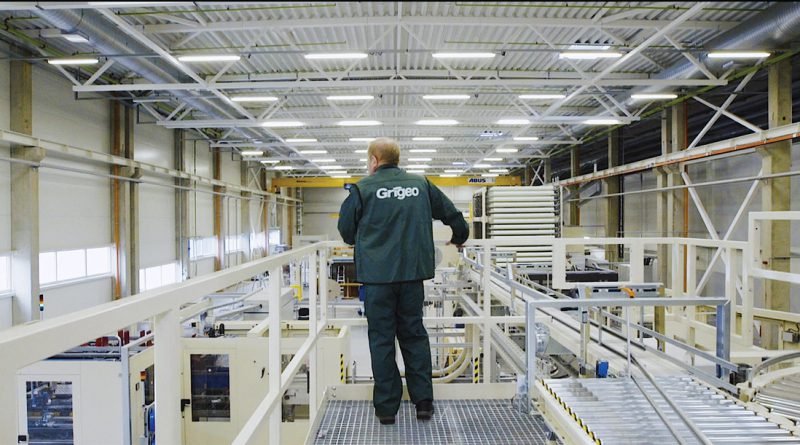Grigeo – A Project Implemented in Due Time
According to the chairman of the board of the company Gintautas Pangonis, a project for active equipment maintenance the implementation of which was initiated almost eight years ago by the company Grigeo in collaboration with engineering solutions company SKF Lietuva had to demonstrate how to plan and perform paper industry equipment maintenance works, also define priorities and challenges.
The benefits of changes had to be proved
G. Pangonis acknowledged that before the introduction of the active equipment maintenance programme there was rarely a day without the incidents related to equipment failure resulting in interrupted production and significant losses. Company’s specialists were tasked with eliminating the failures as soon as possible, even though the works were not scheduled in advance and spare parts were not immediately available.
Firstly, executives of Grigeo started with doing some research. They looked into the good practice in foreign countries in introducing computerized equipment maintenance management systems. At that time, two concepts dominated: outsourcing equipment maintenance and operation or employing specialists and referring to other companies only if assistance or system improvements were necessary.
Robertas Krutikovas, the general manager of Grigeo, agreed that at the beginning of the project they had to decide whether to trust equipment maintenance to external specialists or to employ engineers in the company and, at the same time, preserve know-how. Upon selecting the second option, the employees had to participate in training in order to be able to use the latest technologies. During project implementation process, specialists from Europe, Asia, and South Korea consulted the employees of paper industry factory. Equipment maintenance programme was introduced only after completing training.
According to G. Pangonis, the start of the implementation process was not easy. Employees had to be persuaded to believe in the benefits of works in progress. It took a couple of years for company specialists to appreciate the advantages of the implemented programme, in particular, the fact that there was no longer a need to rush every time to repair unexpectedly faulty equipment.
Works in the company according to consistent schedule
The review of the structure of Technical Division was one of the first tasks for SKF Lietuva specialists. Before the implementation of the project, the company did not have an employee responsible for planning, therefore, the main responsibility fell on group managers. They were in charge of quality, planning, and human resources. Upon reviewing the structure of the division, the positions of the head of Prevention Group and work planner were established; in addition, a person responsible for lubricating the equipment and bearings was appointed which was also a new position in the company.
Later on, company’s processes related to repair works, equipment maintenance, work planning, and ordering spare parts were assessed. Upon evaluating all processes, it was decided to install software IBM Maximo. Analytics tool and analysis for identifying the cause of failure were introduced in everyday work. Moreover, the data about all spare parts was entered into the software; spare parts warehouse management was enabled.
According to R. Krutikovas, when replacing damaged bearing, it is examined and the cause of failure is determined, for example, due to dust, moisture, improper storage, etc. Prior to installing the new part, the causes identified are taken into consideration in order to avoid the recurrence of the failure.
Responsible employees inspect each installation at a certain time and periodicity. Detailed information on when and which equipment needs lubricating, the frequency thereof and the quantity of the lubricant is provided on a computer.
R. Krutikovas argues that work planning is probably the most significant advantage of the programme. Now, repair works are coordinated at least a week in advance, necessary spare parts are ordered and required tools are provided. Every day each employee follows a certain work plan providing information on where in the factory and which assignments must be performed. “At first, employees felt restricted, tried resisting, however, now they all know their tasks and the timeframe. Everything is planned, the workplace is prepared in advance, and the works are carried out with a warranty. We introduced the term “with a warranty” and if we have to return to the same unit in a very short time, it means works did not pass the warranty period. Thus, we determine the cause and what was done wrong,” – general manager of Grigeo told.
It should be mentioned that during training, employees also learned about equipment repair, maintenance, and quality requirements.
Expectation: only planned works
The company has several thousand pieces of equipment; therefore, it is necessary to plan the most important works, thus, a tool “Critical Analysis” was introduced for identifying priorities. Each installation is assessed according to three criteria: in case of failure, what loss would the company suffer; the cost of downtime; and the impact of failure of the equipment on the safety of employees and the environment.
The Prevention Group operating in the company foresees possible risks and failures. With the help of necessary tools, it measures the vibrations of bearings, and if these deviate from standard values, a possible failure in the future may be suspected. Then, the Group makes a decision whether the bearing should be lubricated and its operation prolonged or whether the specific equipment should be registered in the system for the mechanic to repair it according to a plan.
According to G. Pangonis, the project is a continuous process. Employees took a creative approach and are devoted to improving the entire system.
It was estimated that 10 years ago 80 per cent of works in the factory were unscheduled. The expectation was that after the decision to introduce active equipment maintenance programme the situation would drastically change and 80 per cent of all equipment repair works would be planned in advance. The results exceeded expectations as last year unscheduled works amounted only to 4 per cent.
Company’s Prevention Group is small and is tasked to involve all production employees in the process. Technicians developed mobile application used for sending out assignments specifying which equipment should be inspected to shift operators. Performed works are marked in the application, and then the information is transferred to the system and helps specialists foresee the causes of potential failures.
The chairman of the board appreciated that the employees are invested in the maintenance of operated equipment, makes suggestions on how to improve the efficiency of the operation. For example, if it took employee longer to complete works than expected, there were interruptions or unplanned works, all interferences are recorded, and afterwards, engineers planners consider improvements so that works could be performed more efficiently and faster.
The interlocutor acknowledges that neither Grigeo management nor employees who have witnessed the potential of this innovation have any doubts whether it was worth investing in the programme: “I think we moved a huge step forward. Employee mentality, repair culture and habits have changed.”
Currently, company is in the process of implementing additional tools and assessing the potential thereof. The expectations for the next years are no less ambitious as there should be no unscheduled equipment repair works. In addition, figures confirm the benefits of changes: more efficient maintenance of equipment and proper operation thereof together with preventive monitoring helped to increase the capacity of the factory by 15 per cent.
Kristina BUIDOVAITĖ






